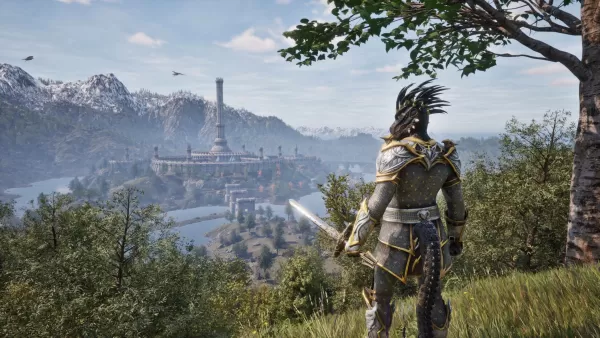"Remakes Key to Bethesda's Revival: Oblivion Shows the Way"
- By Natalie
- May 01,2025
By Azura, by Azura, by Azura – the rumors were true. Yesterday, Bethesda ignited the gaming world with the long-awaited reveal of Virtuos' remaster of The Elder Scrolls IV: Oblivion. This surprise shadow-drop during an 'Elder Scrolls Direct' event quickly led to hundreds of thousands of players jumping back into the game. This moment of global excitement feels like a beacon of hope amidst the recent challenges Bethesda Game Studios has faced. From managing the fallout of Fallout 76's rocky launch to the mixed reception of their new sci-fi venture, Starfield, many fans have been wondering: Has Bethesda lost its magic touch? With fierce competition from RPGs like Larian Studios' Baldur’s Gate 3 and Obsidian's The Outer Worlds, which have been hailed as spiritual successors to Elder Scrolls and Fallout, Bethesda needs a win. While Elder Scrolls 6 and Fallout 5 are still years away, this re-release of Oblivion might just be the step in the right direction – albeit not the one you'd expect.
At its zenith, Bethesda Game Studios was a powerhouse in the RPG genre. According to leaked Microsoft FTC documents in 2020, Fallout 4 had sold an impressive 25 million units, with over 5 million units sold in its first week alone, as reported by VGChartz. In 2023, Todd Howard announced that Skyrim had surpassed 60 million sales, bolstered by numerous re-releases. However, Starfield, despite its potential, only managed to sell around three million units a year-and-a-half post-launch. Even when considering Game Pass subscribers and the absence of a PlayStation version, this figure must be disappointing for Bethesda. Although Starfield does have a dedicated fanbase, it pales in comparison to the fervor surrounding The Elder Scrolls and Fallout series, and fans have expressed dissatisfaction with its first expansion, Shattered Space.
This leaves Bethesda with a significant challenge. With The Elder Scrolls 6 still "years away" and Fallout 5 merely a rumor, how can this once-iconic RPG developer rekindle its fanbase's enthusiasm? The answer lies in revisiting its past glories.
Rumors of the Elder Scrolls IV: Oblivion remaster began circulating in September 2023, sparked by leaked Microsoft documents that hinted at several unannounced Bethesda projects, including a remaster of the 2006 classic. The buzz grew until January 2025, when a former Virtuos employee leaked more details, sparking debates among Elder Scrolls fans reminiscent of the Stormcloaks vs. the Imperials. Last week, the news officially broke, setting the internet ablaze – Google searches for 'The Elder Scrolls IV: Oblivion' surged by 713% in the last week, reaching over 6.4 million. Bethesda's reveal livestream peaked at over half a million viewers. Despite the leaks, over 600,000 people tuned in to witness the re-reveal of a 19-year-old game. The excitement caused discount game key websites like CDKeys to crash, while Fanatical and Green Man Gaming struggled to keep up. As of yesterday, Oblivion had 125,000 concurrent players on Steam and was the #1 best seller. The enthusiasm for this remaster burns as brightly as the flames that pour from the Oblivion gates.
How can this once-iconic RPG developer enchant its fanbase once more? The answer lies in its past. "The message from players is clear: if you (re)build it, they will come." What better way to keep fans engaged during long development cycles than to invite them back to the mysterious isles of Morrowind or the post-apocalyptic landscapes of the East Coast? From a business perspective, this strategy makes sense. While Bethesda's main team works on new projects, trusted partners like Virtuos can leverage existing blueprints to create remasters in a shorter timeframe. These remasters tap into established fan bases and introduce new generations to the rich worlds of Tamriel or the post-apocalyptic adventures in Las Vegas and D.C.
Bethesda has already demonstrated the effectiveness of this approach. During the first season of the Fallout TV show on Prime Video, Fallout 4 was discounted by up to 75%, accompanied by a timely next-gen update that incorporated elements from the show. As a result, Fallout 4's sales in Europe alone surged by over 7,500%, despite being nearly a decade old.
 Looking back at Microsoft's leaked Bethesda roadmap, many noticed a planned Fallout 3 remaster following Oblivion by two years. Although the original timelines have shifted – Oblivion was initially slated for fiscal year 2022 – if these gaps remain consistent, a Fallout 3 remake could be expected around 2026, coinciding with the second season of the Fallout TV show. Given the show's focus on New Vegas in its second season, could Bethesda be planning a surprise New Vegas remake? The seamless integration of the first season's aesthetics with Fallout 4 suggests that Bethesda might be gearing up for another strategic move with the New Vegas-centric second season. After all, they shadow-dropped Oblivion – it's not out of the question that a New Vegas Remastered trailer could be waiting at the end of Fallout Season 2's finale.
Looking back at Microsoft's leaked Bethesda roadmap, many noticed a planned Fallout 3 remaster following Oblivion by two years. Although the original timelines have shifted – Oblivion was initially slated for fiscal year 2022 – if these gaps remain consistent, a Fallout 3 remake could be expected around 2026, coinciding with the second season of the Fallout TV show. Given the show's focus on New Vegas in its second season, could Bethesda be planning a surprise New Vegas remake? The seamless integration of the first season's aesthetics with Fallout 4 suggests that Bethesda might be gearing up for another strategic move with the New Vegas-centric second season. After all, they shadow-dropped Oblivion – it's not out of the question that a New Vegas Remastered trailer could be waiting at the end of Fallout Season 2's finale.
The message from players is clear: if you (re)build it, they will come. However, if there’s one game in Bethesda’s back catalog that truly deserves a remake, it’s The Elder Scrolls III: Morrowind. Fans have been clamoring for this for years, with some even taking it upon themselves to remake Morrowind using Skyrim’s tools, as seen in projects like Skyblivion. However, Morrowind presents unique challenges. It stands at the crossroads of Bethesda’s evolution, built differently from what we now expect from an Elder Scrolls game. It's only partially voiced, with much of the story delivered through text, no quest markers, and simplistic combat physics. While Virtuos successfully modernized some of Oblivion's outdated systems, Morrowind is inherently a collection of such systems. It's what makes it beloved, but also what makes it difficult to remake. Remaking Morrowind is a delicate balance – modernize too much, and you risk losing its original charm; retain too many outdated elements, and it could feel as frustrating as a severe skooma hangover.
When a studio becomes synonymous with a gaming sub-genre, the challenge is to innovate while retaining its audience. Rockstar Games has managed this with Grand Theft Auto through the expansive world of GTA Online, which supports the rumored massive budget for GTA 6. Bethesda's strength lies in its detailed, single-player worlds – Elder Scrolls Online and Fallout 76 haven't captured the same magic. The overwhelming positive response to Virtuos' Oblivion remaster shows that gamers are eager to revisit Bethesda's past. While not every remaster will be a guaranteed success – as seen with Rockstar's GTA Definitive Editions – breathing new life into beloved classics could be Bethesda's path back to the top of the modern RPG scene.
![Kuroku’s Basket: Showdown Zones Tier List [RELEASE] – Best Zones for Each Position](https://img.15qx.com/uploads/89/173890804367a5a18b666e3.jpg)






